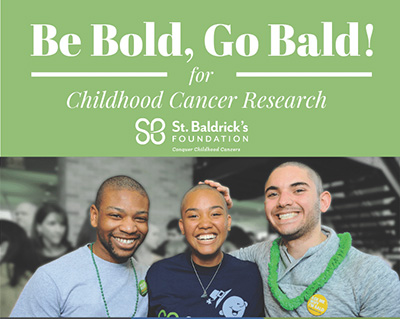Campus News
UCSC goes bald to support childhood cancer research
Staff and students join St. Baldrick’s Foundation event to raise money to fight childhood cancer.

The St. Baldrick’s Foundation, a volunteer-powered organization dedicated to raising money for children’s cancer research, will host one of its signature head-shaving events at the UC Santa Cruz Genomics Institute’s new West Side location on Friday, October 25, from 3 to 4:30 p.m. UCSC staff and students will shave their heads to raise money and awareness for this worthy cause.
Sponsored by the Genomics Institute’s Treehouse Childhood Cancer Initiative, the October 25th event is open to the public. Anyone who wants to support those shaving or sign up to go bald themselves can do so at www.stbaldricks.org/events/UCSC2019.
“It’s a fantastic way to show your support for kids undergoing treatment for childhood cancer,” said organizer Katrina Learned, a UCSC Treehouse staff member who has shaved in honor of her daughter Aurora. Aurora, a childhood cancer survivor, was also one of the inspirations for founding the Genomics Institute’s Treehouse Childhood Cancer Initiative.
Will UC Santa Cruz be able to recapture its crown? The campus won its first Battle of the Bald St. Baldrick’s competition back in 2016, when 28 people shaved their heads and raised $29,488 (see St. Baldrick’s blog post).
Every two minutes a child is diagnosed with cancer; one in five won’t survive, and those who do often suffer long-term effects from treatments. Donations raised at events like this have made it possible for St. Baldrick’s to fund more than $200 million to support the development of childhood cancer treatments that are as unique as every kid. Some of this is invested in projects St. Baldrick’s Foundation funds at UCSC’s Treehouse Initiative in its efforts to combat childhood cancer. Treehouse projects include a tumor database of more than 11,000 samples available for use by all researchers in the pediatric cancer community and beyond.
The mission of the Treehouse Childhood Cancer Initiative is to change the story for childhood cancer patients by employing genomic data and computational approaches that could identify less toxic and more effective treatments. Treehouse analyzes a child’s cancer data against both childhood and adult patient cohorts across all types of cancer. This “pan-cancer” analysis of adult and pediatric tumors may identify situations where an adult drug is predicted to work on a subset of pediatric patients. Learn more at treehousegenomics.ucsc.edu.